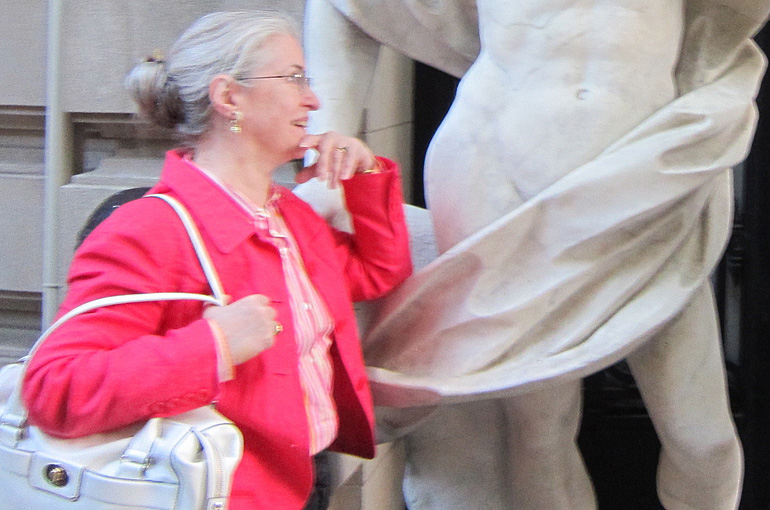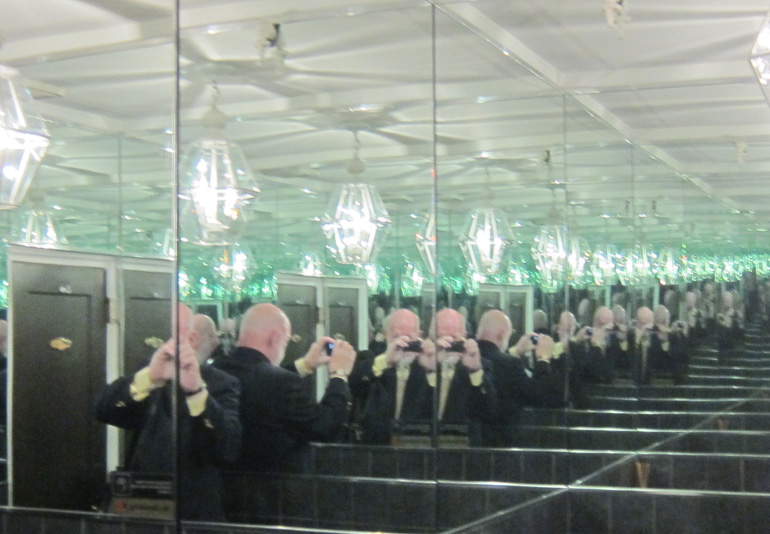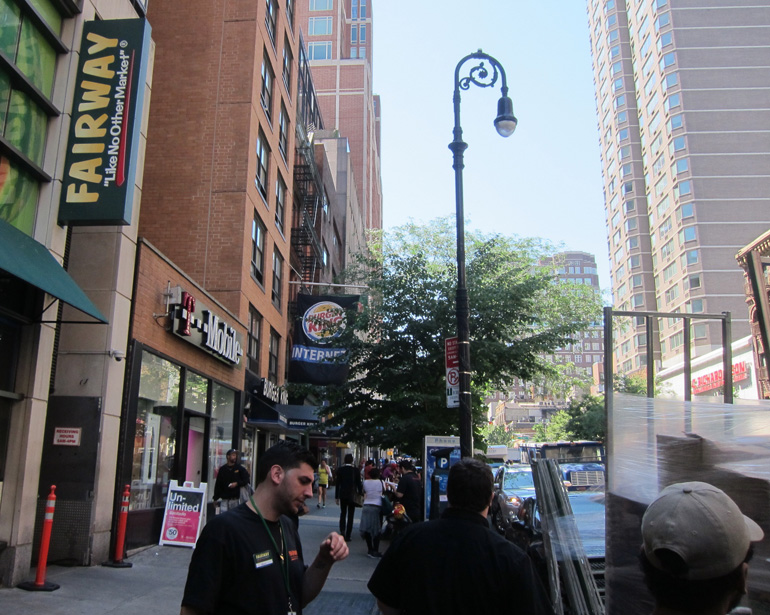Gotham Diary:
La Perruque de Voltaire
17 July 2013
[F]ew sixteen-year-old boys dream of being a father, yet every good writer spent his or her teen-age years dreaming of being a writer, plotting how to become one, rehearsing and practicing, fantasizing and preparing.
So says James Wood (in this week’s New Yorker, reviewing Greg Bellow’s book about his father). I certainly intended to be a writer, almost from the moment puberty hit, but the plotting, rehearsing, practicing and fantasizing, not so much. Did I prepare? Well, I wrote a great deal. All of it rubbish, except perhaps for the history papers that I wrote in school. (They weren’t very good, but they weren’t rubbish.) And I read a great deal. It’s hard for me to resist the very strong impression that I dreamed of becoming precisely the writer that I am today. I never wanted to be a novelist (even though I did try to write one, twenty years ago) — which may be why I skipped the rehearsals and the fantasies. As for what I did want to write, that took a long time to find out. It took time and it took a lot of reading. Like a wine, it took ageing.
But although I wanted to be a writer, I was never very ambitious about it, and this makes me wonder, from time to time, if I’m any good at it. I wonder if I don’t suffer enough when I write. I don’t groan at the keyboard, or struggle to get things just right. (I do a lot of editing with that end in view, but editing is a kind of reading, not writing.) I like to write. I like having written very much, but the actual writing is a pleasure as well, if not exactly a form of bliss. Writing is how I think.
***
Reading Anthony Pagden’s new history, The Enlightenment: And Why It Still Matters, I gradually recalled how attracted I was to the writers of the Enlightenment when I was young. I just might have fantasized about wearing a wig like Voltaire’s. The writers of the Enlightenment were always being quoted, and their remarks were always both pithy and elegant. There was a relaxed, off -the-top-of-the-head quality to their observations, which they could pull off because their heads were packed to the crown with interesting information — interesting, if not always reliable. Their opinions were clear and they enjoyed expressing them as economically as possible. The French writers, anyway. ÂÉcrasez l’infâme! It just doesn’t fly in English.
Pagden’s subtitle expresses an opinion that infuses every page of his book. The author, new to me, has written extensively on European identities and empires. He is aware that “the Enlightenment project” has taken a beating from the postmodernists, but he saves that for his final chapter. Instead of defending the Enlightenment, he demonstrates that it is still in process. We, the WEIRD people of the world, are still working out the details of plans first sketched by the men of the “republic of letters.” The constitutions of today’s liberal democracies embody ideas that were floated by Locke and Montesquieu, among many others, and we are still trying make representative government work more responsively.
To be sure, the French Revolution and its Napoleonic aftermath still seem to have drawn a line marking the end of the Enlightenment, and many of the horrors of subsequent centuries are still attributed by many to the philosophes’ radical anticlericalism. But Pagden digs up the Enlightenment’s roots in the Reformation, which left Europe divided against itself and made organized religion a serious problem for all seekers after tolerant peace. The Enlightenment was headquartered in Paris for a simple reason: nowhere was organized religion more intertwined with government power than in France. With the revocation of the Edict of Nantes, in 1685, Louis XIV rescinded France’s commitment to pluralist progress, and his death, thirty years later, brought an end to what had always been a highly personal style of monarchy. The two kings who followed him were unwilling and unable to keep his blaze alight, but they were also indisposed to tinker much with his legacy, especially in the area of religion. The men of the Enlightenment could see that France’s magnificent conservatism would end in bankruptcy of some kind or another, and, far from a blueprint for its destruction, their work deserves to be seen as a storm protection plan.
It is true that the laicization of the church — the fatal move, in historian William Doyle’s view, that would carry an ever-more paranoid France right into the Terror — appears to be the realization of an item high on the Enlightenment’s agenda. But Kant, in Pagden’s estimation the climactic Enlightenment thinker (Kant lived to celebrate the Revolution, if at a safe distance), would have argued that the move was premature, and Pagden’s portraits of the philosophes convince me that most of them — all but the dodgy Rousseau, in fact — would have agreed. We need to recall, however, that the Church of 1792 was a temporal, foreign power, and its priests its putative agents. This was always the specifically Catholic problem of the post-Reformation world: alone among the religious leaders of Europe, the pope commanded an actual army. From his state in central Italy he engaged in diplomatic alliances just like any secular prince. He also bore the singular power of anathema. It is not hard to see why the revolutionaries deemed it important to cut the French church’s ties to Rome. I am inclined to see the church’s worldly power as a greater evil than the radical excesses of the Revolution. The Terror was hatched by the Inquisition.
(It is for this reason that I regard Augustine, the first leader to invoke state force in dealing with religious matters, as the most wicked figure in Christian history. As the inventor of “original sin,” he is merely the most deluded.)
The great theme of The Enlightenment is cosmpolitanism. This was certainly very important to the philosophes, but it is even more important to us today, because the world is one place at the moment, and we need to do much better at living together with people who think very differently. At this, I believe, we WEIRDos are in the lead, because we have the most experience at agreeing to disagree. In the Islamic worlds, such toleration is impossible even between Sunni and Shia. The Morsi government has just been ousted in Egypt because of its majoritarian intransigence. In Iran, hysterical anti-Western sentiment has been allowed to consume much of civil society and even more of the country’s wealth. I am all for standing on principle, so long as the number of principles does not exceed three. (No killing, no taking, no defaming.) Beyond that, firmness is merely stubborn and childish. The whole thrust of the Enlightenment was to question, to critique, the validity of oppressive doctrines. It did not seek to substitute oppressive doctrines of its own, although oppression was certainly felt by those who would not welcome cosmopolitan acceptance. We must deal with the recalcitrants with Kantian patience, by never abandoning the Enlightenment project of cosmopolitan education. Anthony Pagden’s final paragraphs:
The realists may claim, as realists invariably do, that most of these institutions (the EU aside) are only fora in which people merely talk. But talking counts, and states today spend a great deal more time doing it than they ever have in the past. Then, on another level, few of us the West can, or would probably want to, live out our lives unaffected by the lives of often radically different others. The world of communicating beings that Kant saw as providing the necessary basis for any future cosmopolitan world may still be some way off. But it is far closer than it was in, say, 1945.
None of this was achieved, and nothing in the future will ever be achieved, by shutting ourselves up in communities, by measuring out our lives by the horizons of what our fathers and our forefathers have set down for us, or by regulating our actions, and our desires, according to the dictates of those who have appointed themselves to be the representatives on earth of a highly improbable divinity. Much of what modern civilization has achieved we obviously owe to many factors, from increased medical knowledge to information technologies to vastly improved methods of transport, which although they are an indirect legacy of the Enlightenment and the revolutions in science and technology that both preceded and followed it, have no immediate or direct connection to its ideals. But our ability even to frame our understanding of the world in terms of something larger than our own small patch of ground, our own culture, family, or religion, clearly does. And in that, we are all, inescapably, the heirs of the architects of the Enlightenment “science of man.” For this, then, if for no other reason, the Enlightenment still matters.
***
To me, writing has always seemed to be a way of being private in public. I never thought of it as involving, business aside, meetings with other people — I wanted to share my words, not my company. If I became famous, it would register as letters from appreciative readers. (I’m still working on quantity, but I’ve become familiar with the quality of letters from appreciative readers, and it is exactly what I hoped for.) No, my fantasies about “being a writer” definitely stopped with that wig.




















